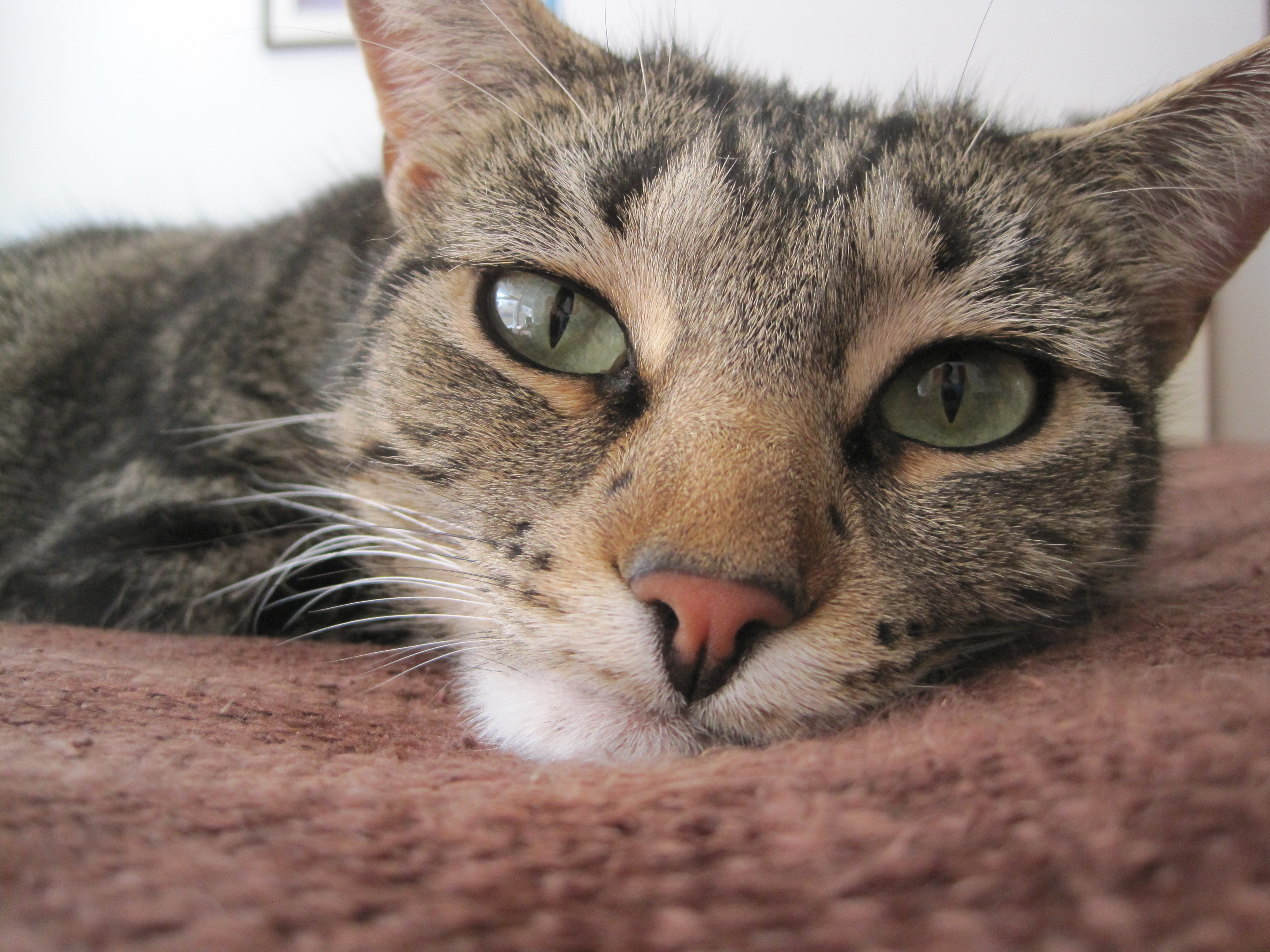“If you’ve never eaten while crying you don t know what life tastes like.”
~Johann Wolfgang von Goethe
Last week, my beloved kitten, Sammy Poptart, bit off the end of her own tail.
I came home from a long, 10-hour day at work to what looked like a crime scene in my apartment, with blood smeared on walls, curtains, and furniture, and completely covering the entire bathroom – the white porcelain of the bathtub, sink, and toilet stained bright red.
After some searching, I found Sammy cowering in the corner of the room, between my bed and the wall, curled up in the fetal position with a pool of blood underneath her. Her tail continued to bleed, with the last 1-2 inches of said tail now a hairless, inflamed, open wound and the very tip no longer intact.
I’d like to say that I maintained my composure in this situation, but I didn’t.
I burst into tears as soon as I saw Sammy, continued to cry as I shuttled her carefully off to the vet, held back tears during our appointment, and then wept periodically throughout that night and the next couple of days.
Then continued to cry for more than a full week.
And although the hysterical crying seems to have largely subsided at this point, I’m still getting choked up frequently throughout the day, and finding myself much more easily moved to tears than is typical for me.
Sammy is on the road to recovery – and has been for several days now – so the copious crying, I realize, is not entirely about the missing tail incident. In fact, if I had to guess, I’d say that any tears shed after about the second day of the kitten crisis were completely unrelated to said crisis at all.
So, what the eff, self?
This is a question I have been asking myself for days, trying to understand from where exactly all these tears are coming, and what could possibly be the cause for so much crying.
Because other than the situation with Sammy, nothing specifically upsetting has occurred over the past couple of weeks. And yet, SO. MUCH. SADNESS.
I spent some time being rather frustrated with myself for becoming suddenly so weepy without a clear reason for feeling that way. Ultimately, however, I decided to sort of surrender to the emotion. Because, hey, maybe my body knows something I don’t.
Your body is smart. Super smart.
And if you pay attention, it will tell you things you need to know. And give you signs. And potentially make you cry ridiculous tears for more than a week without telling you why.
Which can be super irritating, but also kind of awesome. And cathartic.
Emotional tears are good for you. And there is clear scientific evidence to back this up.
Specifically, research has shown that tears cried as a result of strong emotion contain hormones including prolactin, adrenocorticotropic hormone, and Leu-enkephalin in far higher concentrations than in continuous tears (which keep your eyes consistently lubricated) and reflex tears (which are produced in response to irritants in order to protect the eyes from harm).
Adrenocorticotropic hormone is secreted as a part of your body’s stress response, revealing that emotional crying really does help to discharge the hormonal impact of feeling stressed out.
Leu-enkephalin, on the other hand, is a natural pain killer and endorphin, which has opioid-like effects on the body. This may help explain why releasing tears often makes us feel calmer, more relaxed, and in less pain – of an emotional and/or physical nature.
Crying helps you move through and process tough emotions – from sadness and grief, to disappointment and even anger. It also helps you handle your feelings when overcome with positive emotions like intense happiness, love, or gratitude.
Crying is an all-inclusive expression of emotion. Which is pretty rad, if you ask me.
Tears truly are preventative medicine.
Because when you fail to fully experience or express your feelings, they can get stuck. Even the good ones. And this can lead to all sorts of imbalances and disruptions and ultimately illness – which may linger below the surface for a while, but will eventually show itself in more tangible, physical symptoms if not acknowledged and addressed on the emotional plane.
Like I said, your body is smart. And crying is an important way it self-regulates, recalibrates its inner emotional barometer, and discharges toxins – both tangible and intangible – in order to bring things back into balance.
So, I say embrace your tears.
Of sadness, of joy, of frustration, of anger, of fear. Even if you aren’t entirely certain what’s causing you to cry. Even if it seems to make no sense.
And never apologize for crying. EVER. No matter how silly it might seem in the moment.
Your tears make you brave. And beautiful. And absolutely, exquisitely human.
P.S. I wrote this post before finding out that the lovely Miss Sammy Poptart will need have her tail partially amputated to clear away necrotic tissue and damaged vertebrae – a surgery that will be taking place this afternoon. Please send love if you have any to spare.

